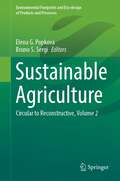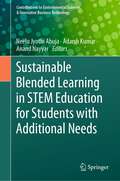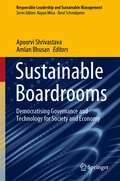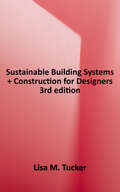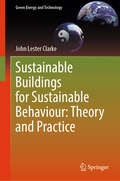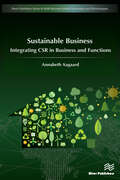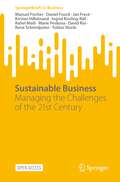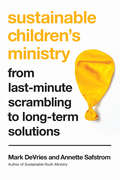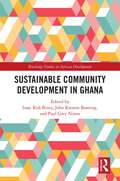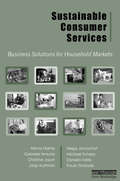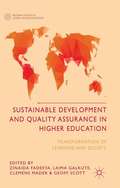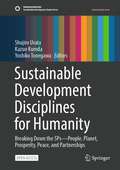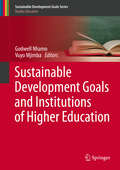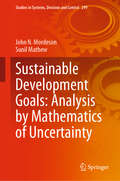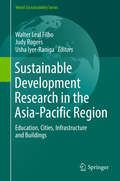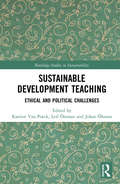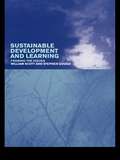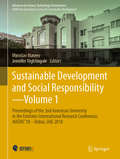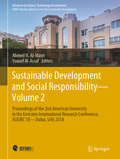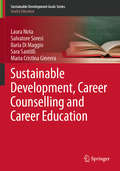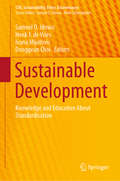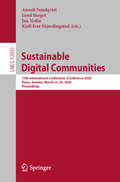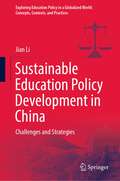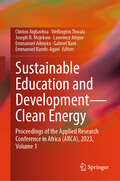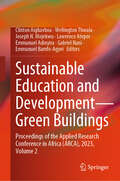- Table View
- List View
Sustainable Agriculture: Circular to Reconstructive, Volume 2 (Environmental Footprints and Eco-design of Products and Processes)
by Elena G. Popkova Bruno S. SergiThis book highlights the environmental footprints and best practices in sustainable agriculture. This second volume includes fifteen interesting chapters that present agriculture in the light of forest conservation, circular economy, climate change, sustainability, food security during pandemics and soil conservation, written by leading experts in the field. It provides and interesting read for researchers, policy makers and professionals in the area of agriculture and economy.
Sustainable Blended Learning in STEM Education for Students with Additional Needs (Contributions to Environmental Sciences & Innovative Business Technology)
by Anand Nayyar Adarsh Kumar Neelu Jyothi AhujaThis book comprehensively covers sustainable blended learning approach in each of the STEM (science, technology, engineering and mathematics) disciplines. The book also includes the compilation of detailed concepts of blended learning ranging from definition, need, features, models, advantages and disadvantages and comparisons with traditional face-to-face learning. Sustainable blended learning in K-12 education has an immense role as foundation to learning for students in their early education. Fostering creativity and inculcating problem solving and critical thinking skills are the integral aspect of STEM education, which encourages students to pursue them to for their future careers. This book presents recent practices taken by experts at various levels to promote education in STEM. Furthermore, impact over teacher–student relationships is analyzed. Lastly, sustainable frameworks, strategies and implementation to incorporate students with additional needs are explored.
Sustainable Boardrooms: Democratising Governance and Technology for Society and Economy (Responsible Leadership and Sustainable Management)
by Apoorvi Shrivastava Amlan BhusanThis book discusses various interactions in the sustainability and development sector. It presents a thematic approach to describe progressive models and cases on disruptions, innovations, regulatory and institutional evolution related to the area of sustainability, through an organizational and boardroom level governance lens. It documents how certain schools of thought, models of engagement and methods-platforms-practices impact society and while doing so, brings together varying theoretical debates, practicing models and instruments of transformation in green governance. Sustainable policy making demands a whole of government approach in decision-making processes. Further, inclusiveness and ‘green’ consciousness of corporate boardrooms are paramount, without which, effective socially responsible business practices are absurd. Human resource development, shaped on sustainable corporate ethics, requires well-trained sustainability specialists, managers that can think ‘green’ in their overall decision making which are essential for green governance. In this context, the book creates a functional, interpretive repertoire of stories, commentaries, life experiences, and reflections of corporate leaders, academics, and practicing consultants, on their decision-making processes, and how they interpret sustainability. These stories and thoughts help create a functional academic construct, which will assist academics teach ‘green’ competencies to business school students better, and entrepreneurs and business executives to better understand the idea of sustainable growth.
Sustainable Building Systems and Construction for Designers: Bundle Book + Studio Access Card, Third edition
by Lisa M. TuckerAuthor Lisa M. Tucker covers topics in a holistic approach, from the structural (site consideration and foundations) to the experiential (indoor air, acoustics, and safety), making a clear case for interior design professionals to understand their moral responsibilities to people and the environment, and to follow sustainable building practices. Now in its third edition, the award-winning Sustainable Building Systems and Construction for Designers has been updated to reflect current CIDA accreditation standards and include recent industry trends related to interior construction, such as security and well-being. Additionally, a complete set of new case studies has been commissioned. Line drawings, color photography, and sample student work join together to support student learning on this essential and timely topic. New to this Edition: -Updated with CIDA Standards 2018 -Expanded content on security, resilience, plumbing, and well-being design trends -Complete set of 7 new case studies -First edition to include STUDIO with self-assessment questions and flashcards and Instructor Resources including an instructor's guide and PowerPoint slides
Sustainable Buildings for Sustainable Behaviour: Theory and Practice (Green Energy and Technology)
by John Lester ClarkeThis book is about where theory meets practice in the realm of sustainable architecture. The book reveals how to create buildings that not only minimize environmental impact but also help shape sustainable behaviour. Including a literature review, comprehensive online surveys, and analysis of real projects, the book presents a narrative that blends theory with tangible examples. It includes illustrated case studies that breathe life into five exemplary sustainable buildings, showcasing their impact. The book demonstrates the potential of architecture to realise a sustainable future. It shows how construction can help build a more sustainable world.
Sustainable Business: Integrating CSR in Business and Functions (River Publishers Series In Multi Business Model Innovation, Technologies And Sustainable Business Ser.)
by Annabeth AagaardThe developments in our environment and society has made it clear that the way we run our businesses and govern our nations is not sustainable in the long run. This is also why more and more companies and organizations are pursuing sustainable business through various Corporate Social Responsibility (CSR) activities. However, many companies experience that although they facilitate a CSR strategy on corporate level, CSR is often not embedded in their business and/or integrated across their functions. If companies are to achieve the full business potential and performance impact of CSR, sustainability has to be operationalized, targeted and measured across the value chain through empowered employees and in alignment with the business strategy of the company. Though state-of-the-art CSR research, theories and models, the theoretical platform for sustainable business and CSR is presented in this book. However, CSR is carried out in practice, and not just in theory. This is why each chapter is supplemented with practical case examples explaining the way in which different companies and their managers have integrated sustainable business in their strategy and across the organizations’ different functions. As is evident both in theory and practice, the success of CSR integration is highly affected by industrial context, as the unique characteristics of the industry have an impact on the key sustainability challenges and business opportunities of the specific company and industry. In support of this evidence, the book also reveals how CSR can be implemented across private and public organizations as well as small & medium sized entities (SMEs).
Sustainable Business: Managing the Challenges of the 21st Century (SpringerBriefs in Business)
by René Schmidpeter Manuel Fischer David Risi Ingrid Kissling-Näf Daniel Foord Jan Frecè Kirsten Hillebrand Rahel Meili Marie Peskova Tobias StuckiThis open access book is a compact guide to the development of sustainable business, which has become the central concept in discussions about the future development of humanity and planet earth. It provides basic terminology and concepts on sustainable business and offers insights into a new management paradigm that integrates social and environmental dimensions into business models, strategies, and operations. New business concepts such as the donut economy, the circular economy, social innovation and sustainable leadership are introduced and the book outlines how they influence the way we run businesses today and in the future. This book lays the foundation for new management thinking in business and academia, making it a essential reader for professionals and students alike.
Sustainable Children's Ministry: From Last-Minute Scrambling to Long-Term Solutions
by Mark DeVries Annette SafstromSustainable Children’s Ministry
Sustainable Community Development in Ghana (Routledge Studies in African Development)
by John Kwame Boateng Isaac Kofi Biney Paul Gary NixonThis book explores sustainable community development in Ghana post-COVID-19, highlighting examples of how individuals facing extreme challenges have adapted to their changing circumstances.Through the voices of African researchers, it explores the different responses that local, subnational, and national stakeholders and communities initiated to preserve the gains made in achieving the Sustainable Development Goals in Ghana during the global pandemic. This collection considers how policy makers are tackling the pressing issues of sustainability, climate change and its effects on Africa and Ghana in particular, and multi-stakeholder policy responses to building communities in a post-COVID-19 world. The case studies show how communities are interacting to ensure sustainable community development and learning in the Global South, and the role that education and learning, both formal and informal, play in strengthening livelihoods, choices, and opportunities in African communities.An assessment of multi-stakeholder policy responses to building communities in Ghana, this book will be of interest to scholars and students in the field of Education, Education Management, Sociology, Economics, and African Studies. It will also be of interest to policy makers and practitioners engaged in community development programmes and activities and the development of associated policies.
Sustainable Consumer Services: Business Solutions for Household Markets
by Minna HalmeThe goal for consumer oriented business should be to make a profit and to do it without costing the Earth. Yet exactly how to satisfy the needs and wants of consumers without contributing to environmental degradation is proving to be the essential, but elusive goal for businesses in the 21st century. The leading solution is to substitute material consumption with the consumption of services that offer consumers convenience and value but eliminate much of the inefficiency and waste associated with our throw-away society. Sustainable consumer services for households - services that are delivered to consumers at the premises such as home delivery of organic food, appliance leasing, mobile laundry services, internet marketing of homeservices or car pool schemes - provide a key part of the answer of how to reduce material consumption and waste while still turning a profit. Yet until now there has been little information to guide the development of such business models and practices, and to develop ways to make service-based consumption more attractive to consumers than object-ownership-based models. This book, equally a practical business handbook and business course text, provides the missing link in sustainable household service competitiveness by examining the issues, looking at business models, providing dozens of real-life best-practice examples and presenting data from the first large-scale consumer survey that explains consumer behaviour and what they want from home service provision. The book is an essential resource for businesses and public or nonprofit organizations and housing organizations entering the growing consumer services market. It provides a wealth of business know-how on what works and what doesn?t, how to avoid potential pitfalls, and how to provide consumer services at the household level that are profitable, environmentally sustainable and that add to consumers? quality of life.
Sustainable Development And Quality Assurance In Higher Education
by Zinaida Fadeeva Laima Galkute Clemens Mader Geoff ScottTo help address the challenges of sustainable development, higher education institutions must transform themselves, bringing together best practice in quality management for tertiary education with best practice in education for sustainable development. This book provides tested strategies and pathways for undertaking this successfully.
Sustainable Development Disciplines for Humanity: Breaking Down the 5Ps—People, Planet, Prosperity, Peace, and Partnerships (Sustainable Development Goals Series)
by Kazuo Kuroda Shujiro Urata Yoshiko TonegawaThis Open Access book provides eight problem solving lectures for sustainable development for people, peace, and partnerships. Those are three of the five keywords for the Sustainable Development Goals (SDGs): people, the planet, prosperity, peace, and partnerships or “the 5Ps”. Each of these lectures is classified into one of the keywords for SDGs and based on the history of social thought, human development, law, education, sociology, and peace studies. Further, each lecture delineates the essence of each discipline when it is practically applied to development studies. This book, Sustainable Development Disciplines for Humanity, along with its sister volume related to the planet and prosperity, Society, will be useful in studying development. Interdisciplinary research is necessary to achieve the SDGs advocated by the United Nations. Hence, it is essential to learn the basics of individual disciplines, as they each offer ample knowledge fostering problem solving through the accumulation of existing research. This and its sister volume are the first comprehensive textbooks summarizing the essence of each necessary discipline to approach development studies from an interdisciplinary perspective. In developing countries, this book will provide access to development research for readers aiming to further develop their own nations. Moreover, in developed countries, the book will provide access to problem-solving research for readers seeking holistic solutions to complex social problems.
Sustainable Development Goals and Institutions of Higher Education (Sustainable Development Goals Series)
by Godwell Nhamo Vuyo MjimbaThis volume brings together both theoretical and case study based contributions to the implementation of the Sustainable Development Goals (SDGs) in Institutions of Higher Education (IHE), presenting an impactful combination of authors from both developing and developed countries. While most current publications addressing the SDGs and education focus on sustainable development in general and specific topics such as climate change or energy, this book attempts to accelerate the localisation of the SDGs by presenting opportunities and innovations offered in various universities and campuses regarding SDGs localisation. The book seeks to provide an important contribution to the global dialogue on IHE and the SDGs, and will be of interest to academics and researchers engaged in the SDGs and education, as well as government agencies and other interested stakeholders. The book focuses on curriculum and learning matters, research and development as well as community engagement. Case studies detail the integration of SDGs in academic and professional development, new approaches to implementing sustainability science instruction, improvements in teaching practices to enhance teacher competence, and responsible management education. Additional focus is placed on the alignment of the SDGs in higher education with the other goals, emphasizing technological innovation for improved human health and environmental management, and climate change policies and action plans. Interdisciplinary solutions for pressing environmental problems are also provided, making sure that no one is left behind in realising these global development goals.
Sustainable Development Goals: Analysis by Mathematics of Uncertainty (Studies in Systems, Decision and Control #299)
by John N. Mordeson Sunil MathewThis book uses mathematics of uncertainty to examine how well countries are achieving the 17 Sustainable Development Goals (SDGs) set by the members of the United Nations, with a focus on climate change, human trafficking and modern slavery. Although this approach has never been used before, mathematics of uncertainty is well suited to exploring these topics due to the lack of accurate data available. The authors place several scientific studies in a mathematical setting to pave the way for future research on issues of sustainability, climate change, human trafficking and modern slavery to using a wide range of mathematical techniques. Moreover, the book ranks countries in terms of their achievement of not only the SDGs, but in particular those SDGs pertinent to climate change, human trafficking, and modern slavery, and highlights the deficiencies in the foster care system that lead to human trafficking. As such it is an excellent reference resource for advanced undergraduate and graduate students in mathematics and the social sciences, as well as for researchers and teachers.
Sustainable Development Research in the Asia-Pacific Region (World Sustainability Series)
by Walter Leal Filho Judy Rogers Usha Iyer-RanigaThis multidisciplinary book focuses on best practices in sustainability research in the Asia-Pacific Region. Drawing links between research, practice, education for sustainability and the needs of industry, it addresses the sustainable development goals (SDGs).The book also presents research undertaken by a wide range of universities on matters related to sustainable development, in order to promote research in this area across multiple disciplines. Four key themes are explored: (1) Education for Sustainability. (2) Sustainable Cities. (3) Sustainable Buildings. (4) Sustainable Infrastructure.This unique book documents and disseminates the wealth of know-how on sustainable development research in the Asia-Pacific Region today. It presents lessons learned and comparative case studies from various countries, including India, China, Indonesia, the Philippines, Bangladesh, New Zealand and Australia.
Sustainable Development Teaching: Ethical and Political Challenges (Routledge Studies in Sustainability)
by Leif Östman Katrien Van Poeck Johan ÖhmanThe aim of this book is to support and inspire teachers to contribute to much-needed processes of sustainable development and to develop teaching practices and professional identities that allow them to cope with the specificity of sustainability issues and, in particular, with the teaching challenges related to the ethical and political dimension of environmental and sustainability education. Bringing together recent scholarship on the topic, this book translates state-of-the-art academic research into teaching models, methods and tools. Starting with an outline of the challenge of sustainability, it offers insights and models for understanding the interesting yet ambiguous concept of ‘sustainable development’ and the complex process of transforming society in a more sustainable direction (Part I). It then goes on to provide a guide to preparing courses and lessons as well as tools for reflection about teaching practices and the multiplicity of approaches to addressing ethical and political challenges in sustainable development teaching (Part II). Finally, the book offers useful conceptual frameworks, models and typologies about the concrete design and implementation of sustainable development teaching (Part III). This book will be essential reading for students of education, as well as teachers in compulsory and higher education and sustainability education researchers.
Sustainable Development and Learning: Framing The Issues
by William Scott Stephen GoughThis book examines the difficult and wide-ranging issues relating to how we understand our environment, our place in it, and how we choose to act. This comprehensive text provides an overview of these developing key issues, illustrating how - through schooling, higher education, professional training and development, and awareness-raising - people can bring about change, as well as engaging in debate and critique of issues. The book builds on existing work across a number of fields, as well as on original international research, in order to model the complexity of the problems, the institutional contexts in which they arise, and the interrelationships between these. Areas explored include the policy context, the links between sustainable development and learning, the economic and moral interdependence of humans and nature, the management, assessment and evaluation of learning, and globalisation. The book suggests ways in which those responsible for learning can target their efforts appropriately, matching straightforward solutions to simple problems, and designing complex interventions only where these are needed. This text will be a valuable resource for anyone studying Masters degrees and MBAs that focus on environment or sustainable development, and for professionals dealing with problems on a day-to-day basis. Though a free-standing text, its analysis is supported by a companion reader: Key Issues in Sustainable Development and Learning: a critical review.
Sustainable Development and Social Responsibility—Volume 1: Proceedings of the 2nd American University in the Emirates International Research Conference, AUEIRC'18 – Dubai, UAE 2018 (Advances in Science, Technology & Innovation)
by Miroslav Mateev Jennifer NightingaleThe book presents high-quality research papers presented at the 2nd American University in the Emirates International research conference, AUEIRC'18, organized by the American University in the Emirates, Dubai, held on November 13th-15th, 2018. The book is broadly divided into four sections: Sustainability and Smart Technology, Sustainability and Social Responsibility, Sustainability, Human Security and Legislation, Sustainability and Education. The topics covered under these sections are sustainable smart technology such as developing green curriculum for information technology, use ultrasonic velocity to predict quality of wheat, improve security features for visa system, factors affecting the cost of production of electricity and desalination plants, impact of smart traffic sensing in smart cities, smart healthcare system, simulation of Grey wolf optimization algorithm in painting digital forensics. The topics covered for sustainability and creative industries such as sustainable concrete production, multimedia applications in digital transformation art, integrating biomimicry principles in sustainable architecture. Sustainability, human security and legislation covered topics of urban performance and sustainable environment, Eco-certification as response on climate change, the criminal offence of tax evasion in law: case study, skills engineering in sustainable counter defense against Cyber extremism, the international law and challenges of trans-boundary water resources governance, the legal status of nuclear energy: case study, sustainable energy development and nuclear energy legislation in UAE, corruption specific safety challenge, environmental management and sustainability, sustainable farming models for desert agro-ecosystems, future directions of climate change, earth and built environment towards new concept of sustainability, institution building from emotional intelligence perspective, virtue ethics, technology and sustainability, the role of humor in a sustainable education, HEIs practices and strategic decisions toward planning for sustainable education programs, TQM in higher education for sustainable future. The papers in this book present high-quality original research work, findings and practical development experiences.
Sustainable Development and Social Responsibility—Volume 2: Proceedings of the 2nd American University in the Emirates International Research Conference, AUEIRC'18—Dubai, UAE 2018 (Advances in Science, Technology & Innovation)
by Ahmed N. Al-Masri Yousef Al-AssafThis book gathers high-quality research papers presented at the 2nd AUE international research conference, AUEIRC 2018, which was organized by the American University in the Emirates, Dubai, and held on November 13th-15th, 2018. The book is broadly divided into two main sections: Sustainability and Smart Business, and Sustainability and Creative Industries. The broad range of topics covered under these sections includes: risk assessment in agriculture, corporate social responsibility and the role of intermediaries, the impact of privatizing health insurance, political events and their effect on foreign currency exchange, the effect of sustainable HR practices on financial performance, sustainability integration in the supply chain and logistics, gender inequality in the MENA economies, the panel data model, the model of sustainable marketing in the era of Industry 4.0, micro-enterprises as a tool for combating unemployment, the impact of financial education and control on financial behavior, measuring financial and asset performance in agricultural firms, a comprehensive strategic approach to sustainability in the UAE, sustainability and project finance, HR analytics, FaD or fashion for organizational sustainability, a conceptual framework of sustainable competitive advantages, psychology of organizational sustainability, Blockchain technology and sustainability, veganism and sustainability, institution building from an emotional intelligence perspective, sustainable concrete production using CWP, occupants’ behavior and energy usage in Emirati houses, the effect of shop lighting on consumer behavior, multimedia applications in digital transformation art, integrating biomimicry principles in sustainable architecture, experimental sustainable practices in fashion education, technology-assisted student-centered learning for civil engineering, and a 10-step design process for architectural design studios. All contributions present high-quality original research work, findings and lessons learned in practical development.
Sustainable Development, Career Counselling and Career Education (Sustainable Development Goals Series)
by Laura Nota Salvatore Soresi Ilaria Di Maggio Sara Santilli Maria Cristina GinevraThis book is based on the Life Design paradigm and discusses the efforts made to overcome the matching paradigm between individuals and their work contexts, in order to guarantee the adoption of an active role for future career planning. Starting from the evolution of career counselling and vocational guidance in the 20th century and then following the more updated reflections in the Life Design paradigm, this book discusses research results from the Larios Laboratory (Padova, Italy) in collaboration with numerous international colleagues and institutions. These results show that career counselling and vocational designing can not only help people to plan their future in agentive ways, but also to help them getting out of the ‘mists of the present’ and to project themselves into a future that is yet to be created. This future is aligned by the world of research and international institutions, such as the UN and WHO, and follows the 2030 Agenda for Sustainable Development, with particular attention to Sustainable Development Goals 4, 8 and 12. This book reveals how trajectories can be created from one’s own mission, realized with the help of others and newly acquired strengths. It shows how career counselling and vocational designing can help people to build their own future from an inclusive and sustainable perspective, based on social justice, and to help build a better future for all.
Sustainable Development: Knowledge and Education About Standardisation (CSR, Sustainability, Ethics & Governance)
by Samuel O. Idowu Henk J. de Vries Ivana Mijatovic Donggeun ChoiThis book examines education about standardization in the context of sustainable management. It shows the role of standardization education in the global economy, and in markets, industries and businesses. The book presents knowledge on standardization for sustainable management, describes measures that can be taken to stimulate it, and highlights strategies for teaching and disseminating the concept. Subsequently presenting a number of best practices and case studies, the book seeks to align theory and practice. For researchers, this is the first academic publication that interconnects the concepts of sustainability, standardization and education. For professionals in the area of sustainability it shows that standardization is an essential instrument for enhancing sustainability for which proper education is needed. For standardization professionals the book reveals the links to sustainability and it shows not only the importance of education about standardization but also how this can be organized, and finally, for universities, the book shows that standardization deserves to be included in the curriculum, and it provides guidance and best practice examples about how this can be done.
Sustainable Digital Communities: 15th International Conference, iConference 2020, Boras, Sweden, March 23–26, 2020, Proceedings (Lecture Notes in Computer Science #12051)
by Anneli Sundqvist Gerd Berget Jan Nolin Kjell Ivar SkjerdingstadThis volume constitutes the proceedings of the 15th International Conference on Sustainable Digital Communities, iConference 2020, held in Boras, Sweden, in March 2020. The 27 full papers and the 48 short papers presented in this volume were carefully reviewed and selected from 178 submissions. They cover topics such as: sustainable communities; social media; information behavior; information literacy; user experience; inclusion; education; public libraries; archives and records; future of work; open data; scientometrics; AI and machine learning; methodological innovation.
Sustainable Education Policy Development in China: Challenges and Strategies (Exploring Education Policy in a Globalized World: Concepts, Contexts, and Practices)
by Jian LiThis book investigates the sustainable education policy development in China in the aspects of challenges and strategies. In this book, the conceptual model of the sustainable education policy development in China is divided into several parts, including the sustainable development of preschool education, the sustainable development of ethnic education, the sustainable development of vocational education, the sustainable development of higher education, and the sustainable development of lifelong learning. This book serves as a reference for scholars and researchers who are interested and work in research on China’s sustainable education policy development, administrators, and stakeholders in China's education system and graduate students who major or minor in the field of comparative and international education.
Sustainable Education and Development—Clean Energy: Proceedings of the Applied Research Conference in Africa (ARCA), 2023, Volume 1
by Clinton Aigbavboa Wellington Thwala Joseph N. Mojekwu Lawrence Atepor Emmanuel Bamfo-Agyei Emmanuel Adinyira Gabriel NaniThis book is Volume 1 of the proceedings of 2023 Sustainable Education and Development Research Conference. This volume concentrates on papers in the area of clean energy. Despite considerable progress, more than 700 million people worldwide still lack access to electricity, and around 2.4 billion people continue to use harmful and polluting fuels for cooking. While efforts have been made to promote renewable energy and energy efficiency, they have not been fast enough to achieve Sustainable Development Goal 7. Adding to the challenge, the ongoing war in Ukraine has contributed to rising global energy prices and heightened energy insecurity in Europe. In response to the energy crisis, some European countries are planning to accelerate the transition to renewables and increase investments in clean energy and energy efficiency. However, others are considering a resurgence of coal, which poses a risk to the overall green transition. Between 2010 and 2020, the percentage of the global population with access to electricity increased from 83% to 91%, with 1.3 billion people gaining access. Nevertheless, this leaves approximately 733 million people still without electricity, and most of them reside in sub-Saharan Africa. Achieving universal access by 2030, the annual growth rate in access needs to accelerate from 0.5 percentage points to 0.9 percentage points, necessitating significant efforts in low-income, fragile, and conflict-affected countries. In 2020, 69% of the global population had access to clean cooking fuels and technologies. While more than half of those without access to clean cooking fuels live in Asia, the 20 countries with the lowest percentage of people having access to clean cooking were predominantly least developed countries in Africa. The share of renewable sources in total final energy consumption reached 17.7% globally in 2019, just slightly higher than the figure for 2015. The electricity sector leads in the adoption of renewables, accounting for 26.2% of total final energy consumption in 2019, while the heat and transport sectors have made limited progress. Global primary energy intensity, defined as global total energy supply per unit of GDP, improved from 5.6 megajoules per dollar (2017 purchasing power parity) in 2010 to 4.7 megajoules in 2019. However, the rate of improvement (1.6% per year on average since 2015) falls short of the 3.2% annual rate needed to reach Sustainable Development Goal 7.3. International financial flows to support clean and renewable energy in developing countries reached $10.9 billion in 2019, a 23.6% decrease from 2018. This decline occurred even before the onset of the COVID-19 pandemic. Over a longer five-year moving average, average annual commitments decreased for the first time since 2008, from $17.5 billion in 2014-18 to $16.6 billion in 2015-19. Although developing countries achieved a record of 245.7 watts per capita in installed renewable energy-generating capacity in 2020, small island developing States, least developed countries, and landlocked developing countries have lagged behind. It would take least developed countries and landlocked developing countries nearly 40 years and small island developing States almost 15 years to reach the same level of progress as the average developing country in 2020. The 2023 SEDRC conference, titled "Sustainable Development and Education," aims to redefine the understanding of research in the continent's development and the role of researchers. The conference focusses on applied research discussions and its dissemination. Researchers from research institutions, academicians, postgraduate students, politicians, and industry representatives will be the primary audience for the conference proceedings.
Sustainable Education and Development—Green Buildings: Proceedings of the Applied Research Conference in Africa (ARCA), 2023, Volume 2
by Clinton Aigbavboa Wellington Thwala Joseph N. Mojekwu Lawrence Atepor Emmanuel Bamfo-Agyei Emmanuel Adinyira Gabriel NaniThis book is Volume 2 of the proceedings of 2023 Sustainable Education and Development Research Conference. This volume concentrates on papers in the area of green buildings. Despite considerable progress, more than 700 million people worldwide still lack access to electricity, and around 2.4 billion people continue to use harmful and polluting fuels for cooking. While efforts have been made to promote renewable energy and energy efficiency, they have not been fast enough to achieve Sustainable Development Goal 7. Adding to the challenge, the ongoing war in Ukraine has contributed to rising global energy prices and heightened energy insecurity in Europe. In response to the energy crisis, some European countries are planning to accelerate the transition to renewables and increase investments in clean energy and energy efficiency. However, others are considering a resurgence of coal, which poses a risk to the overall green transition. Between 2010 and 2020, the percentage of the global population with access to electricity increased from 83% to 91%, with 1.3 billion people gaining access. Nevertheless, this leaves approximately 733 million people still without electricity, and most of them reside in sub-Saharan Africa. Achieving universal access by 2030, the annual growth rate in access needs to accelerate from 0.5 percentage points to 0.9 percentage points, necessitating significant efforts in low-income, fragile, and conflict-affected countries. In 2020, 69% of the global population had access to clean cooking fuels and technologies. While more than half of those without access to clean cooking fuels live in Asia, the 20 countries with the lowest percentage of people having access to clean cooking were predominantly least developed countries in Africa. The share of renewable sources in total final energy consumption reached 17.7% globally in 2019, just slightly higher than the figure for 2015. The electricity sector leads in the adoption of renewables, accounting for 26.2% of total final energy consumption in 2019, while the heat and transport sectors have made limited progress. Global primary energy intensity, defined as global total energy supply per unit of GDP, improved from 5.6 megajoules per dollar (2017 purchasing power parity) in 2010 to 4.7 megajoules in 2019. However, the rate of improvement (1.6% per year on average since 2015) falls short of the 3.2% annual rate needed to reach Sustainable Development Goal 7.3. International financial flows to support clean and renewable energy in developing countries reached $10.9 billion in 2019, a 23.6% decrease from 2018. This decline occurred even before the onset of the COVID-19 pandemic. Over a longer five-year moving average, average annual commitments decreased for the first time since 2008, from $17.5 billion in 2014-18 to $16.6 billion in 2015-19. Although developing countries achieved a record of 245.7 watts per capita in installed renewable energy-generating capacity in 2020, small island developing States, least developed countries, and landlocked developing countries have lagged behind. It would take least developed countries and landlocked developing countries nearly 40 years and small island developing States almost 15 years to reach the same level of progress as the average developing country in 2020. The 2023 SEDRC conference, titled "Sustainable Development and Education," aims to redefine the understanding of research in the continent's development and the role of researchers. The conference focusses on applied research discussions and its dissemination. Researchers from research institutions, academicians, postgraduate students, politicians, and industry representatives will be the primary audience for the conference proceedings.
